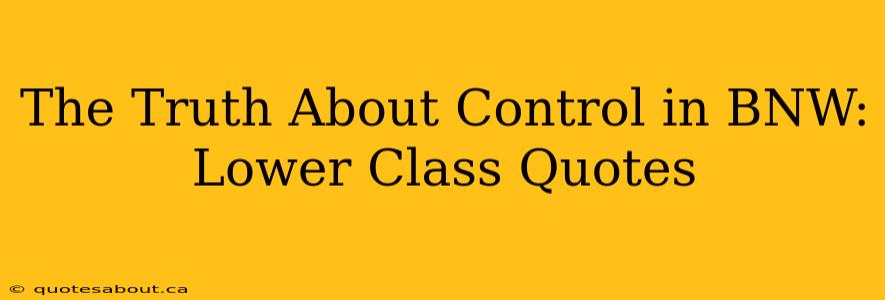Aldous Huxley's Brave New World masterfully portrays a dystopian society where societal control is not achieved through brute force, but rather through sophisticated manipulation of human desires and conditioning. While the World State's control is evident across all classes, the lower castes, particularly the Epsilons and Deltas, offer compelling insights into the insidious nature of this control through their own words and actions. This exploration delves into specific quotes from lower-class characters, analyzing how their limited perspectives and conditioned responses reveal the effectiveness of the World State's strategies.
What are the different social classes in Brave New World?
Brave New World is structured around a rigid caste system, divided into Alphas, Betas, Gammas, Deltas, and Epsilons. Each caste is genetically engineered and conditioned to fulfill a specific role in society, ensuring stability and preventing dissent. This predetermined social hierarchy is crucial to understanding the nuances of control exerted by the World State. The lower castes, particularly the Gammas, Deltas, and Epsilons, are conditioned to be content with their designated roles, lacking the intellectual capacity and desire to question the system.
How does the World State control the lower classes?
The World State utilizes a multifaceted approach to controlling the lower classes. This includes:
- Hypnopaedic Conditioning: From infancy, lower-caste individuals are subjected to repetitive suggestions and conditioning through sleep-teaching, instilling unwavering acceptance of their predetermined roles and societal norms.
- Genetic Engineering: The very creation of the lower castes is designed to limit their intellectual capabilities and aspirations, ensuring they remain docile and compliant.
- Consumerism and Entertainment: The World State provides ample distractions through consumer goods, recreational activities, and readily available sexual gratification. This keeps the lower classes preoccupied and prevents them from contemplating their circumstances or questioning the system.
- Social Conditioning: Through their upbringing and interactions within their caste, individuals are constantly reinforced in the belief that their station in life is natural and desirable.
"Ending is better than mending." – A Delta quote highlighting planned obsolescence
This seemingly simple phrase reveals the World State's control over consumption and its impact on the lower classes. The phrase, instilled through hypnopaedic conditioning, promotes a culture of disposability, encouraging constant consumption and preventing the development of skills like repair or resourcefulness. This reliance on constantly new products ensures economic stability for the World State and keeps the lower classes perpetually engaged in the cycle of consumerism, distracting them from deeper societal issues.
Do lower-class characters in Brave New World ever question the system?
While overt rebellion is rare among the lower castes, subtle instances of questioning or discontent are sometimes observed, though generally suppressed quickly. Their conditioning often leads to expressions of discontent being channeled into socially acceptable behaviors, such as increased consumption or sexual activity. The lack of intellectual capacity and the pervasive nature of conditioning limit their ability to articulate or comprehend the true extent of their oppression.
What is the significance of the lower-class's happiness in Brave New World?
The happiness of the lower classes in Brave New World is not genuine contentment but rather a manufactured state of blissful ignorance. Their contentment is a direct consequence of the World State's control mechanisms. This manufactured happiness is a key element of the dystopia; it demonstrates how easily happiness can be controlled and manipulated, highlighting the ethical implications of sacrificing individual freedom for social stability.
How do the lower-class characters’ limited vocabulary and understanding reflect the World State’s control?
The limited vocabulary and simplistic worldview of the lower castes are direct results of their conditioning. The World State ensures they lack the intellectual tools to critically analyze their circumstances or challenge the established order. This linguistic limitation reinforces their social and intellectual confinement, making it impossible to conceive of a world outside of the World State's meticulously constructed reality.
Conclusion: The Silent Power of Control in Brave New World
The quotes and actions of the lower classes in Brave New World serve as powerful reminders of the insidious nature of societal control. The World State's control is not achieved through overt oppression but through subtle manipulation of biology, psychology, and social structures. By examining the seemingly content lower castes, Huxley demonstrates how effective societal control can be when it operates at the level of individual desires and perceptions, rendering even the most basic forms of rebellion unthinkable or impossible. The apparent happiness of the lower classes is, therefore, a chilling testament to the success of the World State's manipulative strategies.

